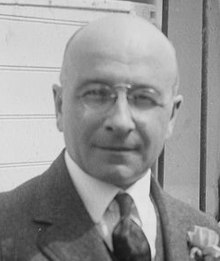Nobel Laureate Alexis Carrel on GOD, Christianity & Prayer
Author/Compiler: Tihomir Dimitrov (http://nobelists.net; also see http://scigod.com/index.php/sgj/issue/view/3)

ALEXIS CARREL – NOBEL LAUREATE IN MEDICINE AND PHYSIOLOGY
Nobel Prize: Alexis Carrel (1873–1944) won the 1912 Nobel Prize in Medicine and Physiology “for his work on vascular suturing and the transplantation of blood-vessels and organs.” Carrel single-handedly created the method for transplanting organs from one human body to the other. He is the founder of modern transplantology.
Nationality: French; later American resident
Education: M.D., University of Lyons, France, 1900
Occupation: Researcher at the University of Chicago and the Rockefeller Institute for Medical Research, NY; Professor at the University of Lyons, France
1. In his book Reflections on Life (New York: Hawthorn Books, 1952) Alexis Carrel wrote:
“Jesus knows our world. He does not disdain us like the God of Aristotle. We can speak to Him and He answers us. Although He is a person like ourselves, He is God and transcends all things.” (Carrel 1952, Chap. 6, Part 7).
2. “Why are we here? Where do we come from? What are we? Is it absurd to believe in the survival of the soul?
Only religion proposes a complete solution to the human problem. Christianity, above all has given a clear-cut answer to the demands of the human soul.” (Carrel 1952, Chap. 6, Part 5).
3. “The need of God expresses itself in prayer. Prayer is a cry of distress; a demand for help; a hymn of love.
Prayer gives us strength to bear cares and anxieties, to hope when there is no logical motive for hope, to remain steadfast in the midst of catastrophes.” (Carrel 1952, Chap. 6, Part 7).
4. In Reflections on Life, Prof. Carrel expressed his attitude towards Christianity thus:
“We are loved by an immaterial and all-powerful Being. This Being is accessible to our prayers. We must love Him above all creatures. And we ourselves must also love one another.
A new era had begun. The only cement strong enough to bind men together had been found.
Nevertheless, humanity chose to ignore the importance of this new principle in the organization of its collective life. It is far from having understood that only mutual love could save it from division, ruin and chaos. Nor has it realized that no scientific discovery was so fraught with significance as the revelation of the law of love by Jesus the Crucified. For this law is, in fact, that of the survival of human societies.” (Carrel 1952, Chap. 3, Part 6).
5. “Christianity offers men the very highest of moralities. It presents to them a God who can be adored because He is within our reach and Whom we ought to love.” (Carrel 1952, Chap. 9, Part 4).
6. “I want to be like smoke in the wind at God’s disposal.” (Carrel, as cited in Newton 1989).
7. “It is, of course, a waste of time to talk to children of theology and duty. But we should follow Kant’s advice and present God to them very early indeed as an invisible father who watches over them and to whom they can address prayers. The true mode of honoring God consists in fulfilling His will.” (Carrel 1952, Chap. 8, Part 3).
8. “The words of Jesus penetrate deeply into the reality of life. They ignore philosophy; they break all the conventions; they are so astonishing, that, even to this day, we find them hard to understand.
To him who obeys the law of the jungle, the command to love his neighbor as himself seems absurd.” (Carrel 1952, Chap. 6, Part 7 “The Need of God”).
9. “Nevertheless, Jesus knows our world. Wherever we are at any moment of day or night, Jesus is at our disposition. We can reach Him simply by turning toward Him our desire and our love. It is an easily observable fact that, even in the society created by science and technology, this need of God has persisted.” (Carrel 1952, Chap. 6, Part 7 “The Need of God”).
10. “Millikan, Eddington, and Jeans believe, like Newton, that the cosmos is the product of a Creative Intelligence.” (Carrel 1952, Chap. 6, Part 6).
11. “For modern man, the only rule of conduct is his own good pleasure. Everyone is enclosed in his own egoism like the crab in its shell and, again like the crab, seeks to devour his neighbor.” (Carrel 1952, Chap. 1, Part 1).
12. “It is sheer pride to believe oneself capable of correcting nature, for nature is the work of God. To command nature, we must obey her.” (Carrel 1952, Chap. 2, Part 6).
13. “Our civilization has, in truth, forgotten that it is born of the blood of Christ; it has also forgotten God.
But it still understands the beauty of the Gospel narratives and of the Sermon on the Mount. It is still moved by those words of pity and love which bring peace, and sometimes even joy, to the broken, the afflicted, the sick and the dying.” (Carrel 1952, Chap. 3, Part 6).
14. “Christian morality is incomparably more powerful than lay morality. Thus man will never enthusiastically obey the laws of rational conduct unless he considers the laws of life as the commands of a personal God.
Unfortunately, most modern men are incapable of acting for the love of their neighbors, of their country or of God, for the only thing they love is themselves.” (Carrel 1952, Chap. 6, Part 2).
See also Alexis Carrel’s books:
- Prayer, New York, Morehouse-Gorham, 1948
- The Voyage to Lourdes, New York, Harper, 1950
- Man, the Unknown, New York, Harper, 1935
- Log in to post comments




Recent comments